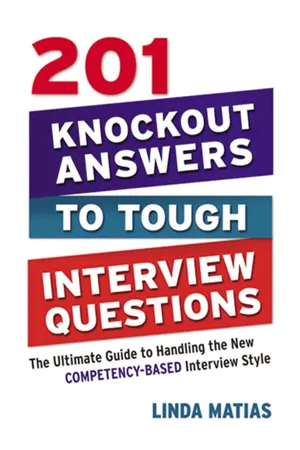
201 Knockout Answers to Tough Interview Questions
The Ultimate Guide to Handling the New Competency-Based Interview Style
- 208 pages
- English
- ePUB (mobile friendly)
- Available on iOS & Android
201 Knockout Answers to Tough Interview Questions
The Ultimate Guide to Handling the New Competency-Based Interview Style
About this book
This useful resource will help you gain a storehouse of sample interview answers that consistently highlight your ability in these areas.
Employers today are using increasingly tough interview questions to evaluate candidates based on key competencies and determine how well they think on their feet. To stand out in these competency-based interviews, job seekers must be prepared with situation-specific examples and answers to questions that highlight their accomplishments, knowledge, and abilities--and clearly display how all three meet their potential employers’ needs.
In 201 Knockout Answers to Tough Interview Questions, you’ll learn the five core competencies most interviewers are looking for:
- individual responsibility (decisiveness, independence, flexibility, career goals);
- managerial skills (leadership, delegation, strategic planning);
- motivational factors (ambition, initiative);
- analytical skills (problem solving, attention to detail);
- and people skills (teamwork, communication, customer service)
Featuring fill-in-the-blank exercises and a plethora of traditional and quirky interview questions to help you prepare, this powerful book will help you get noticed by key players during the interview process--no matter what questions get thrown your way.
Trusted by 375,005 students
Access to over 1 million titles for a fair monthly price.
Study more efficiently using our study tools.
Information
Part I
The Fundamentals
Chapter 1
What Are Competency-Based Interviews?
Competency-Based vs. Traditional Interview Questions
Proficiencies That Competency-Based Questions Measure
Competency #1. Individual Responsibility




Competency #2. Managerial/Leadership Skills




Competency #3. Personal Motivation


Competency #4. Analytical Skills


Competency #5. People Skills



Industry-Specific Competencies
Accounting and Finance
Banking
Table of contents
- Cover Page
- Title Page
- Copyright Page
- Contents
- Introduction
- 201 Competency-Based Interview Questions At a Glance
- Part I: The Fundamentals
- Part II: Competency-Based Questions and Answers
- Part III: The End of the Interview
- Contributors
- About the Author
Frequently asked questions
- Essential is ideal for learners and professionals who enjoy exploring a wide range of subjects. Access the Essential Library with 800,000+ trusted titles and best-sellers across business, personal growth, and the humanities. Includes unlimited reading time and Standard Read Aloud voice.
- Complete: Perfect for advanced learners and researchers needing full, unrestricted access. Unlock 1.4M+ books across hundreds of subjects, including academic and specialized titles. The Complete Plan also includes advanced features like Premium Read Aloud and Research Assistant.
Please note we cannot support devices running on iOS 13 and Android 7 or earlier. Learn more about using the app